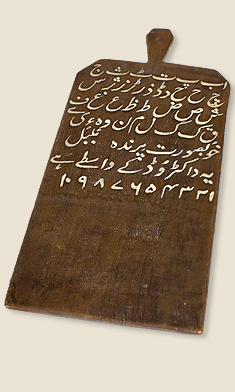To a Fledgling Calligrapher
“Let your calamus be medium thick. Do not nib it at a knot, for this would make matters knotty. Do not write with a twisted calamus, or with one with an uneven split. If you cannot afford a Fārisī or Baḥrī calamus and are obliged to use a Nabataean one, select those which tend to have a brown color. Make your knife sharper than a razor; do not cut anything with it but the calamus, and take very good care of it. Let your nibbing block be of the toughest wood available, so that the point may come out evenly. In cutting your calamus keep to the middle between obliqueness and evenness. When you write fine letters, hold your calamus even, so that the letters may come out well; when you write large letters, hold it inclined towards the side.”7 Advice given by Ibrāhīm ibn al-ʿAbbās to a pupil in his presence.
7Quoted from Franz Rosenthal’s translation of Abū Ḥayyān al-Tawḥīdī’s Epistle on Penmanship, with slight modifications. Published in Four Essays on Art and Literature in Islam. Leiden, 1971, p.42.
A Scribe’s Lament
قيل لوراق ما السرور قال جلود واوراق وحبر براق وقلم مشاق وسئل وراق عن حاله فقال عيشي اضيق من محبرة وجسمي ادق من مسطرة وجاهي ارق من الزجاج ووجهي اشد سوادا من الزاج وحظي اخفى من شق القلم ويدي اضعف من القصب وطعامي .امر من العفص وسوء الحال الزق بي من الصمغ“A scribe was asked, ‘what is pleasure’? He answered; parchments, papers, shiny ink and a cleft reed pen’. And when asked about his condition, he replied, ‘my livelihood is narrower than an inkwell, my body more slender than a ruler, my rank (standing) more delicate than glass, my face darker than vitriol, my lot more concealed than glass the slit of a nib, my hand weaker than a reed, my food comes from gall nuts, and bad luck clings to me like gum arabic.’”8
8ʿAbd al-Malik al-Thaʿālibī. Kitāb khāṣṣ al-khāṣṣ (Beirut, 1966), p.69.

